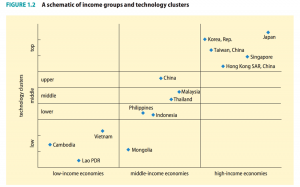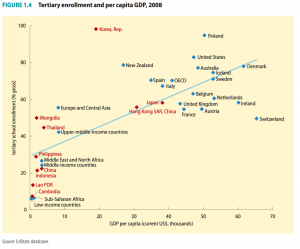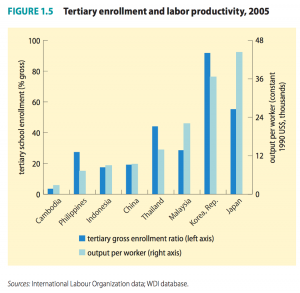(Note: income level is given by GDP per capita. Economies’ position in the figure reflects their ranking by income and technology. Technology clusters are divided into three on the basis of the skill and hig-tech intensity of their products and exports.)
this proxy provides an assessment of an economy’s productivity and ability to move up the value chain within the service, manufacturing, non-manufacturing industry, and agricultural sectors.
Interestingly Japan has relatively high HE enrollment ratio(50+%) compared with other Asian countries. Korea has the highest level of enrollment ratio across the globe. However, Japan still has the highest level of GDP per capita and output per workers. There must be other factors leading to the outputs. However if we analyze from the perspective of higher education, I would say Japan has the highest capability of transferring knowledge/technology in HE into output.
Source: http://siteresources.worldbank.org/EASTASIAPACIFICEXT/Resources/226300-1279680449418/7267211-1318449387306/EAP_higher_education_fullreport.pdf



Hi Chaoyi,
Thanks for your comments. Totally agree with you. And regarding your comments that ecconomic status is related directly to the perception (parents/students) and the capability to offer educational resources, I can’t agree with you more. I believe education, including HE, is in nature unfair. The education we receive is largely based on the social and economic status of the household.
Thanks, Data Group. It is very interesting to evaluate the relationship between HE enrollment and those outputs in the economy. I feel that it is an interrelated circle. If we compare HE in rural areas with megacities in China, we can see how the economic environment influence the whole education system. Economic status is related directly to the perception (parents/students) and the capability to offer educational resources (tutorials and interesting groups are very expensive). If a graduate student decides to go back to his rural hometown (which we encourage students to do so in China), he would make great contributions to accelerate economic growth there. In the country level, the economic power also influences the budget allocated to the education sector. And meanwhile, the development of HE would boost innovations and partnerships that transfer the knowledge/technology into economic outputs.